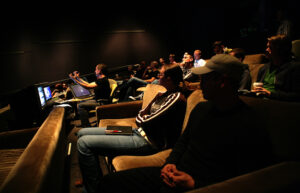Recently, Psy DeLacy spoke with USV students about her life at Rhythm & Hues, PDI/DreamWorks, and Pixar. She made it clear that she was speaking as an alumn and not representing any of her employers. Not surprisingly, she brought up the very special feelings she has for working on characters and projects that people will love. In this piece, we share what she had to say about shot work and Dailies.
Right up front, Psy exclaimed, “I cried while working on Coco, it’s that good. As a member of the simulation team, I would watch the storyboards on my desk and it would take my breath away.”

Psy often starts her workday with a big cup of coffee and email. “A lot of work goes on overnight at a studio”, she says. “Renders kick off overnight as do many simulations. In the morning you either get an email with a title like ‘Congratulations, your render has completed!’, or you get a sad face email specifying some unhappy error if something didn’t go right.” The importance of these messages as part of a team takes precedence. “You want to make sure that anything you publish or any shot you are working on hasn’t gone into a state of explosion either for yourself or for another department downstream. If you publish an asset and then someone from another department sends a note saying, ‘that prop you just published caused everything in our shot to break’, then you need to make sure you fix it.”

Daily review sessions provide structure for the process. “Usually, it’s just your department”, says Psy. “In my case, it’s shot work. Typically, we show shots every day. You can take unfinished shots to dailies. You can take something that is unfinished, totally out of the box, and say, ‘Hey guys, I don’t know how to do this. What would you do’?” She stresses the importance of being able to say, “I don’t know how to do this”. She shakes her head for emphasis as she says it is not a sign of weakness – it is a sign of strength if you can go and ask for help!
The structure of daily reviews enables a very powerful kind of communication between members of the team. Anyone who wants to show shots uses the venue to address a variety of challenges. One person might say, “Hey, this shot is almost done. What do you guys think?”, and the team might say it looks great, go take it to review. Or, a team member will tell the group, “I’ve been working on this for a couple of days and I’m stuck. How would you do this?” In this setting, it’s OK to admit defeat. The team will give help and move on.
“As a simulation artist, you might get a shot or a series of shots in a sequence”, says Psy. “Sometimes I will run simulations on a shot and it will run smoothly out of the box (in which case I will take it to show at Dailies) or literally everything will explode.” The debug stage is where the real work begins. What is causing the shot to explode? What is happening? “If I have a character with a sweatshirt, and say his sleeve is just exploding off of his body, why is that happening?” In these cases, Psy described for her audience the process of reviewing all of her collision objects and her pre-roll to see what is going on. “Cleaning everything up is a big part of what shot work is all about.”
Stay tuned for more from Psy DeLacy’s visit to USV.


